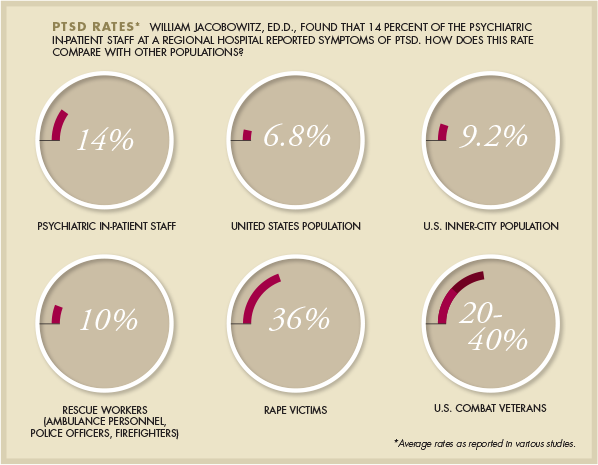William Jacobowitz, Ed.D., is studying post-traumatic stress syndrome in psychiatric hospital staff.
Assaults and threats of assault against psychiatric nurses occur regularly.
Four years ago, a nurse at Franklin Hospital on Long Island was brutally beaten and ultimately disabled by a psychiatric inpatient. Angry over not being discharged, the man broke the leg off of a chair in his room and used it to attack the nurse—Mary Sweeney—who was conducting a group therapy session in another room.
William Jacobowitz, Ed.D., an assistant professor at the College of Nursing and Public Health, knows from long experience that while Ms. Sweeney’s case was extreme, assaults and threats of assault against psychiatric nurses occur regularly and that they are traumatizing for the victims as well as their colleagues. “I used to manage a psychiatric emergency room where there was very frequent violence, and I had noticed that the staff exhibited certain symptoms, certain reactions, that reminded me of post-traumatic stress syndrome,” Dr. Jacobowitz says.
Personal experience prompted Dr. Jacobowitz to study the issue in greater depth. Last year, working with Cheryl Best, M.S. ’13, and Lucy Mensah, M.S. ’13—who, at the time, were College of Nursing and Public Health graduate students—Dr. Jacobowitz assessed the in-patient staff at a psychiatric hospital for symptoms of post-traumatic stress disorder (PTSD). Through surveys, he and his team found that nearly 14 percent of the staff reported symptoms of PTSD. Most surprisingly for Dr. Jacobowitz, the rate of PTSD did not correlate to exposure to violence or threats of violence. The only factors that the PTSD rate did correlate with were resilience and personal satisfaction with the work of caring for patients. Based on his research, Dr. Jacobowitz recommends that psychiatric hospitals facilitate the development of resilience in their staff by providing routine and early debriefing of staff after violent episodes.

For further information, please contact:
Todd Wilson
Strategic Communications Director
p – 516.237.8634
e – twilson@adelphi.edu